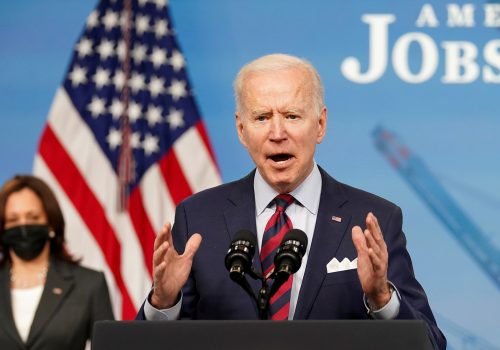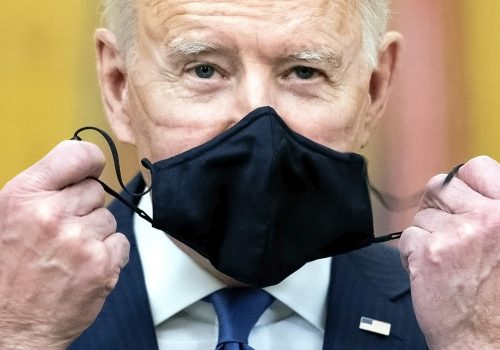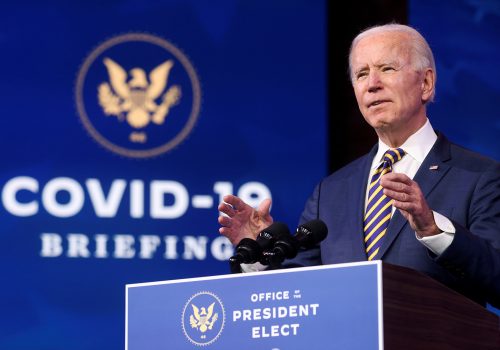FAST THINKING: Biden’s challenge to China and Congress
GET UP TO SPEED
The United States stands at an “inflection point.” That’s how President Joe Biden described an array of challenges at home and abroad during a speech to a joint session of Congress on Wednesday to mark one hundred whirlwind days in office. To a socially distanced hall of masked dignitaries, Biden staked out ambitious domestic plans and placed them in the frame of broader competition with China to “win the 21st century.” What does his laser-focus on China mean for the world’s most important international relationship? What did we learn about where Bidenomics is headed? Can he tackle the crisis at the southern border? Our experts are here to assess the key takeaways.
TODAY’S EXPERT REACTION COURTESY OF
- Josh Lipsky (@joshualipsky): Director of the GeoEconomics Center
- Barry Pavel (@BarryPavel): Director of the Scowcroft Center for Strategy and Security
- Jason Marczak (@jmarczak): Director of the Adrienne Arsht Latin America Center
What’s behind Biden’s big plans
- Biden used the speech to lay out his $1.8 trillion American Families Plan, which includes universal pre-kindergarten, free community college, and paid family leave. It comes on top of a proposed $2.3 trillion infrastructure package that touches everything from high-speed rail to in-home healthcare. “If even a portion of what was outlined last night becomes law, Joe Biden will have redrawn America’s economic blueprint for the decade,” Josh notes.
- But Josh adds that Biden owes a debt of gratitude to the Federal Reserve chairman. The president’s “enormously ambitious economic vision” was “made possible by what Jay Powell said a few hours earlier in the day” when the Fed signaled near-zero interest rates through 2022 and a continuation of its “massive monthly bond purchases” that are juicing the stock market. Josh points out that gross domestic product figures released this morning show more than 6 percent annualized growth for the US economy—“the fastest acceleration in a generation (and a number that will rival China’s GDP growth in 2021).”
- “All of this is rocket fuel” for Biden’s LBJ-like vision for remaking the American economy, Josh says. “His big bet is that the successful vaccine rollout reminded Americans that government can work and reminded the world that America knows how to lead.”
- But he appends a warning to that observation: “Threats loom on the horizon: inflation, broken global supply chains, confrontation with China, and, as India’s tragedy reminds us, a resurgent virus. Any of these could easily derail the agenda.”
Subscribe to Fast Thinking email alerts
Sign up to receive rapid insight in your inbox from Atlantic Council experts on global events as they unfold.

Missing pieces
- Biden packed a lot into his first one hundred days on the job, not to mention Wednesday’s 65-minute speech, but Barry points to two important elements that were missing from the address: humility about the United States’ domestic shortcomings—which tends to have a disarming effect when raised in consultations with allies and friends—and bold international initiatives to update the post-World War II order. “We need to hear as much boldness on the foreign-policy front—of course, only after consultations with allies about such bold strokes have been accomplished—as we already have heard from President Biden on the domestic front. Maybe it still is too early, but the world isn’t waiting for our policy and strategy reviews to finish.”
- What the president did do was focus squarely on China, including an ad-libbed rumination on his talks with a “deadly earnest” President Xi Jinping: “He and others, autocrats, think that democracy can’t compete in the 21st century with autocracies,” Biden said. As Barry notes, “Biden sees China as the greatest challenge to United States security, prosperity, and values. We have never faced a broad-based challenge like this before.”
- And that’s why the president dwelled on accomplishments at home, he adds: “If Biden can rally Americans to support his domestic agenda, then it gives that much more heft to US efforts to galvanize the rest of the democratic world to counter” China.
South of the border
- Facing criticism for his administration’s handling of a surge in migration at the border with Mexico, Biden urged Congress to pass a comprehensive bill that marries a path to citizenship for undocumented immigrants with stronger border security—or, failing that, at least protections for farmworkers and other immigrants brought to the United States as children. But Jason says immigration reform is only “part of the larger equation.”
- The most important part of the equation is a proposed $4 billion investment in the Northern Triangle countries of Honduras, Guatemala, and El Salvador, as part of a diplomatic effort led by Vice President Kamala Harris. “Giving hope to those in the region so they don’t have to leave their homes will decrease pressure on our southern border and make our larger neighborhood more secure,” Jason says. “It won’t be easy. The challenges are deep-rooted and complicated, and politics and polarization add to the challenge to bring the region’s decision-makers and civil society on board. But launching this effort in the president’s first one hundred days gives hope that long-term US commitment may finally be in the cards.”
Further reading
Sun, Apr 11, 2021
Biden’s start reflects audacious domestic and global ambitions
Inflection Points By Frederick Kempe
Biden’s boldness in his first one hundred days can be measured most graphically by the numbers: the four trillion dollars and counting that he hopes to generate to finance an American pandemic rebound, a surge in US jobs and growth, and a mountain of national infrastructure investments.
Wed, Mar 10, 2021
FAST THINKING: The geoeconomics of Biden’s stimulus
Fast Thinking By
Congress just passed Joe Biden’s American Rescue Plan. Don’t be fooled by the bill’s name, though; this legislation has huge implications not just for the United States but also for the pandemic-plagued world.
Thu, Jan 14, 2021
FAST THINKING: Biden’s $1.9 trillion message to Congress
Fast Thinking By
Joe Biden is unveiling a nearly two trillion dollar package aimed at beating back the pandemic and economic crisis. What’s the key thing to know?
Image: President Joe Biden addresses a joint session of Congress in Washington DC on April 28, 2021. Photo via Melina Mara/Pool and REUTERS.


